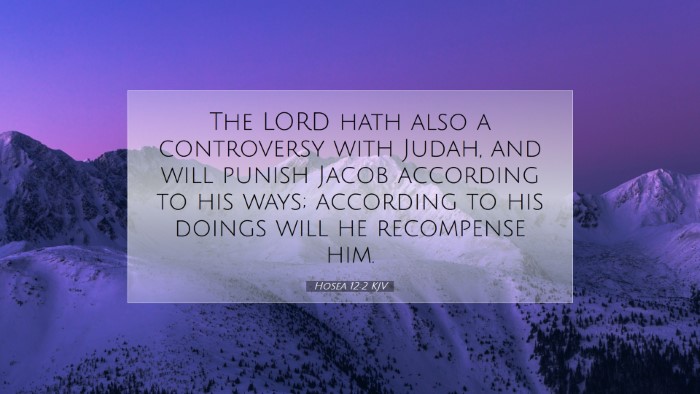Old Testament
Genesis Exodus Leviticus Numbers Deuteronomy Joshua Judges Ruth 1 Samuel 2 Samuel 1 Kings 2 Kings 1 Chronicles 2 Chronicles Ezra Nehemiah Esther Job Psalms Proverbs Ecclesiastes Song of Solomon Isaiah Jeremiah Lamentations Ezekiel Daniel Hosea Joel Amos Obadiah Jonah Micah Nahum Habakkuk Zephaniah Haggai Zechariah MalachiHosea 12:2
Hosea 12:2 KJV
The LORD hath also a controversy with Judah, and will punish Jacob according to his ways; according to his doings will he recompense him.
Hosea 12:2 Bible Commentary
Commentary on Hosea 12:2
"The Lord hath also a controversy with Judah, and will punish Jacob according to his ways; according to his doings will he recompense him."
Contextual Overview
This verse is pivotal in the book of Hosea, serving as a critical juncture where the prophet underscores God's impending judgment upon both Israel and Judah. These verses reflect Hosea's prophetic ministry during a time of significant moral and spiritual decline in Israelite society.
The Nature of God’s Controversy
Both Matthew Henry and Albert Barnes emphasize that this "controversy" signifies God’s legal dispute or challenge against His people. They elaborate that this is not merely a complaint but a formal declaration of judgment against Israel's infidelity and immorality.
- Divine Justice: Henry highlights that God's covenant with Israel entails blessings for obedience and curses for disobedience. This theme runs throughout the Old Testament, reinforcing the importance of loyalty to Yahweh.
- Moral Accountability: Barnes explains the necessity of accountability, suggesting that God's judgments are a natural response to the deeds of humanity. The verse reflects the principle of retribution inherent in the divine order.
Jacob’s Reckoning
The choice of the name Jacob, as opposed to Israel, carries significant implications according to Adam Clarke. It reflects a prophetic reminder of Israel’s origins and inclinations towards deceit and struggle, as Jacob was known for his wrestling with God (Genesis 32:24) and for his name change after he overcame his past.
- Identity and Character: Clarke points out that referring to the nation as Jacob instead of Israel signifies their historical tendencies to stray from God’s ways, invoking a warning to reflect upon their lives and realign with their divine calling.
- Retributive Justice: The recompense “according to his doings” implies a divine measure that seeks to correct and purify rather than simply punish. Such a perspective invites deeper reflection on God’s desire for restoration.
The Theological Implications
In profound theological inquiry, this passage highlights several key themes:
- The Character of God: The nature of God is not only one of judgment but also of covenant fidelity, seeking to bring His people back to the covenant path.
- The Importance of Repentance: Hosea’s prophetic message consistently calls for repentance. The verse implies that recognition of wrongdoing is critical for receiving God's mercy.
- Covenantal Relationships: The references to Jacob's ways underline how personal and communal actions impact the broader covenant community's relationship with God.
Practical Applications for Today
For modern pastors and theologians, Hosea 12:2 serves as a poignant reminder of several truths relevant for the Church today:
- Vigilance Against Apostasy: Just as Israel faced judgment, contemporary believers are called to vigilance, to avoid complacency and attraction to secular values.
- Call to Accountability: The seriousness of sin and the call to repent remains central to ecclesiastical leadership and teaching.
- Hope in Restoration: Despite the solemnity of divine justice, we are assured of God's desire to restore His people, highlighting the importance of grace alongside truth.
Conclusion
Ultimately, Hosea 12:2 encapsulates the profound relationship between God and His people, marked by both covenant fidelity and the consequences of infidelity. The combined insights from public domain commentaries enhance our understanding of this verse, encouraging a holistic approach to scriptural interpretation that necessitates contextual awareness, theological reflection, and practical application.


